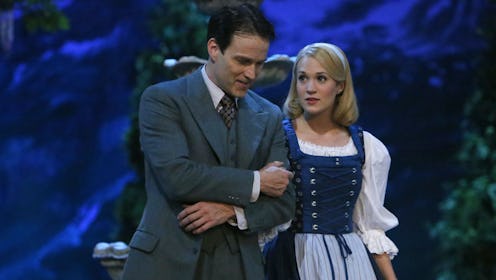
When NBC first announced The Sound of Music: Live! starring Carrie Underwood, those of us who grew up knowing that Julie Andrews was the only governess we ever needed to teach us to sing were incensed. How could a country singer and American Idol winner even match Andrews' perfection? For heaven's sake the woman is both Mary Poppins and Maria von Trapp in our childhood memories — it doesn't get any more perfect than her.
But then, it seemed we were being a bit harsh. Underwood has a good voice, perhaps she really could pull this thing off. Upon tuning into the live broadcast of the musical, it was clear that good faith was for naught.
Underwood undoubtedly has an incredible singing voice, and we've heard examples of that throughout the commercials and previews that NBC has riddled us with. To top it off she's got NBC favorites and Broadway vets Christian Borle and Laura Benanti to round out the cast while True Blood's Stephen Moyer does his best to keep up as Captain von Trapp. The problem, of course, isn't vocal — even in the case of Moyer. The true problem is emotional.
The beauty of The Sound of Music and the reason it continues to stand as a cultural institution is its emotional core. When Maria sings "The hills are alive... with the sound of music," you feel every note of that incredible song in every fiber of your being. And when Captain von Trapp sings "Edelweiss," knowing that he and his family are about to escape into exile from the Nazis, the tears it produces are countless. The discussions of love as ownership and "16 going 17" being a song about a young man supposing a woman is lost in the world without him are mere trivia, because at the heart of the musical is unbridled emotion — the kind of emotion so volatile that Maria can't keep it inside and she simply must sing out into the hills. Why else would the nuns have to sing "What are we going to do about Maria?" The woman's simply filled with too many feelings.
Unfortunately, when Underwood and Moyer combine, the result is a void of depth or feeling. She appears too preoccupied getting the songs and dances correct — both of which she tackles wonderfully — to actually act when she's confronted with the emotional development of her von Trapp romance. When Brigitta finally tells Maria she's in love with the Captain, it's news to Maria and to us too. Did they even know each other? Have they ever exchanged more than ceiling-bound glances in each other's general direction? Hell, Benanti was more excited as the flippant Baroness beckoning the von Trapp children to sing for her than Underwood's Maria was to get married.
It's understandable that the stakes were high; Underwood was charged with leading a beloved, classic musical onstage and live for an entire nation. It can't be easy to face something that intimidating. However, she didn't just take on songs, she also took on a story that means something to many of us. And while Underwood may have hit the notes correctly and overcome some sound level issues in the first few scenes, the thing that made Andrews great weren't her perfect vocals; it was the fact that she exuded a sense of purity of heart and emotion that was uncommonly good — so good, it almost felt as if she was an angel sent down to rescue the von Trapps from their doldrums.
Underwood is beautiful, she can sing like a Disney princess, and it's no wonder Captain von Trapp is intrigued, but she's not truly Maria. She's playing a part on a stage and singing the right songs to elicit the emotions her acting cannot. Hers is a valiant effort, especially in the face of those who were determined to see her fail, but those dissenting voices were somewhat right.
Perhaps, in some instances, it doesn't always make sense to climb every mountain. Some mountains are just meant to stand pristine and untouched as a relic time long gone, and as it turns out, The Sound of Music and Julie Andrews' legacy are some of those things.
Image: NBC